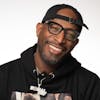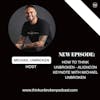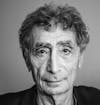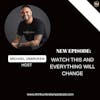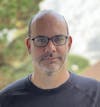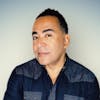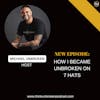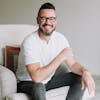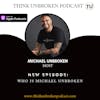Overcoming Childhood Trauma: Michael Unbroken on A Better Life Podcast
Join Michael and Brandon Turner in this powerful episode as they share incredible journey from a childhood of immense trauma to becoming an inspiration for others seeking healing... See show notes at: https://www.thinkunbrokenpodcast.com/overcoming-childhood-trauma-michael-unbroken-on-a-better-life-podcast/#show-notes
Join Michael and Brandon Turner in this powerful episode as they share incredible journey from a childhood of immense trauma to becoming an inspiration for others seeking healing and success.
In this candid conversation, Michael delves deep into his past, revealing the horrors of childhood abuse and the generational cycle that haunted his family. He explores the profound impact of trauma, big or small, and how it can shape an individual's life, even influencing their relationships and approach to conflict.
Michael also sheds light on the connection between trauma and ambition, revealing how he overcame his struggles with weight and substance abuse. The episode unfolds the turning point that led to his remarkable transformation, instilling the power of small changes for lasting impact.
Join us for this enlightening episode, filled with remarkable insights on healing, personal development, and overcoming adversity. Michael Unbroken's story and wisdom are sure to inspire and empower anyone on their journey towards healing and success.
************* LINKS & RESOURCES *************
Learn how to heal and overcome childhood trauma, narcissistic abuse, ptsd, cptsd, higher ACE scores, anxiety, depression, and mental health issues and illness. Learn tools that therapists, trauma coaches, mindset leaders, neuroscientists, and researchers use to help people heal and recover from mental health problems. Discover real and practical advice and guidance for how to understand and overcome childhood trauma, abuse, and narc abuse mental trauma. Heal your body and mind, stop limiting beliefs, end self-sabotage, and become the HERO of your own story.
Join our FREE COMMUNITY as a member of the Unbroken Nation: https://www.thinkunbrokenacademy.com/share/AEGok414shubQSzq?utm_source=manual
Download the first three chapters of the Award-Winning Book Think Unbroken: Understanding and Overcoming Childhood Trauma: https://book.thinkunbroken.com/
Join the Think Unbroken Trauma Transformation Course: https://coaching.thinkunbroken.com/
@Michael Unbroken: https://www.instagram.com/michaelunbroken/
Follow us on TikTok: https://www.tiktok.com/@michaelunbroken
Learn more at https://www.thinkunbrokenpodcast.com
Learn more about Brandon Turner at: https://www.beardybrandon.com/
Support this podcast at — https://redcircle.com/think-unbroken-with-michael-unbroken-childhood-trauma-cptsd-and/exclusive-content
Advertising Inquiries: https://redcircle.com/brands
Privacy & Opt-Out: https://redcircle.com/privacy
Support the Podcast: Become a listed sponsor!
Follow me on Instagram @MichaelUnbroken
Learn more about coaching at https://coaching.thinkunbroken.com
Get your FREE copy of my #1 Best-Selling Book Think Unbroken: https://book.thinkunbroken.com/
Brandon: Michael Unbroken dude. Welcome to the podcast. Thanks for being here.
Michael: Thanks man, it's an honor. I'm excited to be here with you. Sweet dude.
Brandon: All right. So I know you as first of all, I know you're an author of several books, I know you're a life coach for trauma survivors, host of a amazing podcast Think Unbroken. I know Ryan Peneda said you were the most prepared person was ever interviewed him ever. And I know that you're one of the very few, maybe the only person that Grant Cardone has ever given money to. And I want to hear that story, but let's go back before all that. Who was Michael Unbroken?
Michael: Yeah, you know man, I have been able to figure something out that kept me trapped forever. And that was how to heal from massive child abuse, and we can go as deep as you care to go here. But the highlight of it, man at four years old, my mother, who was a drug addict, an alcoholic actually cut off my right index finger. No. So I've had multiple skin grafts, multiple surgeries, I can't feel it. My stepdad who she married when I was six was It's just a monster dude. Imagine a guy our size, six foot four, two 20 beating up a seven year old, putting me in the hospital, beating up my brother, like just the weakest, most cowardly man you can imagine. And as I've done this work now on myself for over 13 years and coaching people for over eight, writing the books, the podcast, man, the thing I always come back to is hurt people, and it's been just my absolute mission. It's the thing that drives me to just show people possibility, dude.
Brandon: I want to talk about that era. What causes somebody to cut their kids to hurt their kid period, but like to that level of trauma?
Michael: your guess is good as mine, man. There's a lot of hearsay in those stories. My grandma would say one thing, my mom would say another, my sister would say another and I was four, so I just don't remember it's so blanked out of my memory, I have no idea. And, I think one of the things about that is, as I reflect on that, this scar, dude, kept me trapped forever, until I was 25 years old. And I was, I grew up in a home where it was not okay to be you. I had no say in who I was, I had no identity, I try to teach this to my clients all the time. Trauma and abuse is actually the theft of identity. It's not even the cuts, the scars, the burns on my body that I carry, it's like the fact that I never got to be a kid, I never got to be a human being. And so by the time that I was eight, we were so poor. I lived with over 30 different families. My mom was in and out of rehab. My stepdad was an over the road trucker. We never knew when he was going to be home. And man, I stayed at strangers houses, church families, houses homeless, where I literally at 11 years old, heading into 12, I lived in an abandoned house by myself for six weeks. Stealing 30th and Georgetown and Indianapolis right there by the raceway. And it wasn't until my grandmother had just come to check on me. Where she was like, okay, I haven't heard from anyone in a while. My mom had ghosted, I have no idea what happened to my mom. My stepdad and her were going through a divorce at the time. And I was just by myself, my grandma had one of my brothers, and then the other one my mother had put into a group home. She was always just trying to get rid of us, she chased drugs and alcohol more than loving her children, and my grandma comes and adopts me. And you would think this is like a godsend, right? And in a lot of ways it was, but I'm biracial, black and white, and my grandma's an old racist white lady from a town in Tennessee you never heard of, and when I say that, I'm not like bullshitting, we had a copy of Hitler's autobiography Mein Kampf in our kitchen, we weren't allowed to have black kids in our house, and my uncle's a part of the Aryan Brotherhood. So imagine the chaos that happens in a child's mind at that age. Yeah. 12 years old being bearing witness to all of this travesty and I did what I think any kid under that circumstance and in that environment would do and I just started getting high every day. Dude, I got high for the first time. I was 12, started popping pills by 13. I was getting drunk and by 15 I got kicked out of school for selling drugs and it's that was normal where I come from. And that whole journey, you asked that question, I want to circle into that like, how does a parent do that? The answer is, I don't know, but I know that the path that was laid in front of me from her experiences made me understand something at a very young age. And that's that there are both good people in the world and not so good people in the world. And being exposed to that level of violence and chaos made me chaos. And it was through just doing a tremendous amount of work and ultimately hitting a rock bottom, which we can talk about that has led me to where I am today.
Brandon: Wow. Did your mom have that similar upbringing? Was she traumatized as a child as well? Was this a generational thing that just got passed down or was it just the drugs and alcohol just sent her off on the wrong path?
Michael: No, I think it was definitely passed down. So when I was 18, that's a great question. When I was 18, My mom was sober for the first time ever and my grandmother had a heart attack and went into a coma. And so me and my little my next youngest brother. We're like hanging out at home by ourselves Just trying to figure out all the chaos of like literally going in the couch cushions to like order a pizza, and my grandma comes out of this coma my mom ends up Coming to the hospital. She's sober Allows, talks to my grandmother and my grandmother was like, you need to move into the house and come take care of these kids, right? ‘Cause she's in a coma or she's just coming out. She's now almost half paralyzed, like it's crazy, dude. Within, I'm not even joking with you within three weeks of my mother being in my grandmother's house. And now this is the first time I've ever seen my mom sober. She is back to drinking a gallon of vodka a day and popping pills. And it wasn't until I was about 31 years old, where I was sitting in my therapist's office one day and he looks at me and we're having this conversation and I'm like, you know what, dude, I am so tired of being here. I'm so tired of looking at your stupid face, I'm literally saying these words, drinking this dumb tea out of the same stupid glass in the same uncomfortable chair for the last couple of years and like I'm tired of cleaning up other people's messes, like this is the conversation I'm having with him. And he says, yeah, I understand. He's just like this amazing therapist, and he goes, I want to ask you a question though, while you're in the heat of this moment and I go, sure, whatever, like that's your job. And he goes, have you ever thought about what your mom's childhood was like? And to answer your question, it's all of the above the chaos, the abuse, the suffering she must've went through leads to that, which leads to me and my siblings, and then ultimately us being the ones who are breaking the cycle.
Brandon: There's a, I'm going to probably butcher the verse, but there's a biblical principle that says I'm going to pass the sins of the father onto the kids, the seventh generation. And a lot of people have looked at that over the years and thought, maybe it's, it sounds like a really cruel thing that God is saying he's going to pass down like this I'm going to, I'm going to hurt your kids because you were bad. But I've always read that and consider that more like the things you do get passed down from generation to generation. So when you have that, the generational curse is not an outward thing, it's an inward thing, and I see it time and time again, her people.
Michael: And I think it's both genetic and energetic, right? It's quantum because if you really think about it, like we are the DNA of our ancestors, like you're carrying stuff from lineage that you don't even understand. And people want to like. Combat that, which I'm like, that's fine, but like science is science, right? And you go look at it. We carry DNA all the way back to whether it's Adam and Eve or the Big Bang, whatever you consider to be life. And then energetically, man, it's the same way, when you're on the highway and some dudes like four cars over and you look at them and he looks back at you and you're like, how the hell did that just happen? Like we carry energy in our lives, and so the energy of my family led to this space where I basically destroyed my whole life. So at 18 now, my mother is in this place of drinking and getting high every day, crashing her car, threatening to kill me and my brothers in this really dark, manic, depressive space. And, dude, one, one night she came and attacked me, and I had never hit my mother one time, never, even though she beat the shit out of me, she would torture me and my brothers, let my stepdad lock us in closets, like it was just like the darkest things. I got molested in the church and I told her and she was like, never tell anybody. And my mom was not a good person, but she was a hurt person. And this night she attacked me, dude, I pushed her to the ground and I stood over her and I said, if you ever touch me again, I will kill you. And I meant it, and I said, you're not my mother, never talk to me again. And until the day she died, I didn't. And I promise you this, two things. One, it is the hardest decision I've ever made, because it's genetic and energy. She is a part of me, whether I like it or not. And two, had I not made that decision, there's no way I would be here with you right now. Zero percent chance.
Brandon: You had to draw that line in the sand and say no more. Yeah, how do you, and maybe this will come up later and maybe we'll touch on it now, but how do you view forgiveness? Do you forgive your mom? Do you need to forgive your mom? Is that part of the healing process? And apparently she's not with us anymore. Like how do you view that?
Michael: Yeah. I think a big part of it, man, is recognizing forgiveness is actually for you, it's not for them, and that's a really hard thing for people to reconcile. Because it's about letting go and if you're not willing to do that, you carry the weight of that forever. And when I was, my brother calls me, I'm like 24 and he's Hey man, mom died and I go, okay, thanks. Have a great day, and I hung up the phone and Brandon, what I'm going to say is real. It was the greatest sense of release and freedom I'd ever felt, but there was still like a price I was paying from my relationship with her and that price came in relationships with other women. With my friends, with my family, with my community, where I was terrified of love and connection and companionship and to sit and have a convert, dude, more about me in 10 minutes than people who knew me until I was 30 years old. You know what I mean? And so I think that when I look at forgiveness, it really is for me and I don't think some acts are forgivable. How do you forgive some of the most heinous things that have ever happened? But there's also that level of are you willing to let go of it and not allow it to be the thing that defines who you are? And that's where I got stuck so frequently because I would, you do, dude, I think the most dangerous sentence in the human language is that's just how I am. And when I was at my worst dude, so I 18, right after this moment with my mom, I got kicked out of school again. And I said to myself, I'm going to make a hundred grand a year legally. And the legal part was like really important because I have family in prison for life literally to this day I've been in handcuffs more times than I can count and my three best friends got murdered Bro, so I knew where I was going Yeah, and like I made that declaration of myself and I chased money and I got super successful I landed a job with a fortune 10 company almost made a million bucks by the time I was 26 But the impact of my relationship with my mother, my stepfather, the trauma, the abuse, the hiding, the lies, the secrets put me in this place where at 26, I'm 350 pounds, 350 pounds smoking two packs a day, drinking myself to sleep, cheating on my girlfriend. I'm 50, 000 in debt, my car got repoed on an 80, 000 Cadillac CTS, just like bad boys too. And my little brother one day tells me, never talk to me again, you're not my brother. And so it's until I was able to step into forgiveness for myself, honestly, because of a lot of my actions and my choices, not this bullshit where people are like, I forgive myself and then they go do it again, where it was like, for real, like I'm going to forgive myself so I can move forward. It wasn't until I could do that and then allow my mom the space of forgiveness and my stepfather and my grandmother and my community and my school and my teachers and the church and everybody did I find freedom, and so I think forgiveness is everything.
Brandon: Wow. All right. So I want to dig a little bit more into that and I want to ask about how the trauma maybe affected your drive and your ambition, but before we get there I want to throw in this week's sponsor for the show. One thing we do different on the show is every bit of money we make from the show, all the money from the ad revenue goes directly to a charity or cause of your choice the guest. What breaks your heart? Where should we send this money to?
Michael: Yeah, man. I love and support Operation Underground Railroad. Think Unbroken, my company, we have donated to them constantly over the last, I think, five years, four or five years. Got introduced to them through Russell Brunson, and I end up having Nick Nanton, who was one of the directors of one of the documentaries come on the podcast and just have followed Tim Ballard and what he's doing for years. And as a kid who was molested and as a kid who comes from an environment of just massive pain for children, like that's so near and dear to my heart. And I'm like, if we can arrest every one of these people, man, I'm like, let's go, let's get them all, dude.
Brandon: A hundred percent, agreed, man. All right. So let's get into that. Did trauma drive to give you the ambition? Was it the pain that made you so successful at 20, mid twenties, you're making a ton of money or was it, do you think that was irrelevant to it?
Michael: All right. So here's one of the like pros, this is a really weird thing to say. One of the pros of being a homeless child and living with all those families and all of those environments, is I got exposed to different realities that are really young age. I think some kids never get that and they're just in violence and chaos all the time. I'll never forget this, one day we're at this. I'm at this house because my brothers were someplace. My sister was, it was always gnarly. And we're in this home, we're getting ready to have dinner, it's quiet. No one's screaming at each other. There's like music on in the background and shit. And I'm like, what is happening here? And I'll never forget this until the day I die, it's cemented in my brain. One of the kids talks back to the dad, and he didn't get slammed through a wall. And I was like, oh my god. That's a thing? That's how dangerous, like having an opinion in my house was the fastest way to get fucked up, and so being able to see that happen was, it just planted a seed in my mind of, Oh my God, there's something different that's possible in this life and in this world. And when I was young, there was always things that I just pushed through, I don't really have a gray area, I'm either all in or all out and I think that's a defense. I know it's a defensive and safety mechanism, the drive for me came the first time. Dude, I don't know if I ever told this story before. The first time I ever walked inside of a prison, I was seven. And when you walk into prison, the first thing that they do, whether you're seven or 70 is they pat you down and you got to stand in between the electrified gates. And there's a guard with guns who's in front of you with the dogs, and I'm with my grandmother and my other brother. We're going to see my uncle, and my uncle's still there, right? 30 something years later, and dude, the terror that I had of walking in there at seven years old made me go, I will never have this in my life, right? And so as a kid, even though I was like selling drugs and breaking into houses and stealing cars and getting shot at by the cops and getting put in handcuffs, call it dumb luck, call it divine intervention, call it me being smarter than the police. I have no idea, bro, but I'll tell you what I got out of every one of those situations. A lot of my friends didn't, and so I'd been driven. The thing that I was chasing was like getting out. But you have to think about what getting out meant when you're a kid from where I'm from. It's like getting out is can you make enough money to put rims on your car? We don't know any different. I'm not exposed to the reality of safety, of wealth, of financial freedom, of residual income, of corporate jobs, bro. My first job was like literally selling dime bags, right? Selling pills out of my grandma's cabinet to my friends, like the crazy like that and I was just, I was like, man, I'm going to figure something out. I didn't know what the, it was, but when I was 18 and I got kicked out of high school again so Mr. Bush shout out, I always give this dude's props because he's one of two teachers that ever stood up for me. And when I mean what I say, when that is he did not let me get away with anything. And this dude been teaching, I don't know, probably 20 years, right? He's seen everything. I'm not the first kid to come through school with this story. And I come to him my senior year. The beginning of the second semester, and I walk up to his classroom, second floor corner of Northwest High School, which is now defunded and closed because it's a dropout factory, one of the worst high schools in America, what city was that in? It was Northwest High School, and they had this study done by Harris Research called the Dropout Factories. I think they still do it. But the year I graduated, it was one of the worst schools in the entire nation and they defunded it because it was so bad and kids kept getting murdered at school and just all kinds of craziness, like we had real cops with real guns and real metal detectors at my school, like you watching TV shows. And so I go up to Mr. Bush's classroom and I'm like, Hey man, I'm gonna keep it real with you. I'm not coming to your class this year. And cause it was like seven a.m., or 7:15 bell. And I'm like, bro, I'm out till two in the morning, like getting it. And working a job at Hollywood video, trying to have a cover piece and like hanging out with my girlfriend doing what high school kids do. And I'm like, and he tells me, just check in with me and do homework and we will figure it out, dude. He gave me an opportunity, right? And he said, this is the way we will navigate this. ‘Cause I get it, many times I checked in and did homework zero. So my girlfriend calls me, I'm at home, this is the end of the school year. I'm stoned, I'm playing video games, and she goes your name is not on the graduation list. And I was like, fuck, I knew why to like, there was no question why. So I got in my car, I drove to school, second floor, corner of the building, went to Mr. Bush's classroom and I wait for the period to end and he comes out and me being like Henri 18 year old man, all fucking testosterone. I go, how dare you fail me, and he looks at me and goes, don't talk to me like that young man, reasonable. I smacked the shit out of a kid, talk to me like that. You know what I mean? And he goes, I didn't fail you, you failed yourself. And then he told me the most important thing to this day. Anyone has ever told me. He said, if you want something in life, you have to earn it. You can't get by on your charms and your good looks. And he made me go to summer school. And it was incredibly embarrassing, unbelievable. It might be the most on the most embarrassing moment of my whole life, and when I'm in summer school, all my friends uninvite me from every graduation party, they won't call me. They won't pick up the phone, I'm not hanging with them. No more, I'm the loser. Now I was already a loser, but now it's like for it was solidified like it was in writing, and so I'm in summer school, it's like the second or third week. And the teacher comes up to me, the irony in this, by the way, is Mr. Bush was a business teacher.
Brandon: That's funny. And have you connected with him since?
Michael: Randomly, I go to a Best Buy in Carmel, Indiana, when I'm 27, and I see him. And I do brand, I've never been so nervous. I've met celebrities, I've met Bill, I've had dinner with billionaires, I was shaking walking up to that man because he changed my life forever. And so I'm in summer school and the summer school teacher pulls me out in the classroom. He goes, it's obviously you don't want to be here. We're going to give you the diploma and we're going to let the streets figure you out. That's literally what he told me. And so that thing where I was like, I need to make 100 grand a year came out of those two moments, I think. And the drive, here's the problem. If you have drive without clarity, you're going to get everything and nothing, and so at 26 I had made all that money. I was overweight, I was in this chaotic situation, I got everything I wanted and nothing at the same time.
Brandon: Was that rock bottom?
Michael: It was rock bottom 997.
Brandon: Yeah. It's drag on the bottom.
Michael: Dude, I was just like hanging out down there. Just smoking joints down there, getting drunk down there, hooking up with strangers down there, being in debt down there, not communicating with my family down there, and then I put a gun in my mouth. And that's when it was real fucking dark. ‘Cause when I was 14, like I was living in this apartment with my mom, my grandmother kicked me out. She's you got to go live with your mom again, do I'm done with you. And so I'm living in this apartment. Dude, my mom is just trashed every night, and like she had passed out on the stairs. I'd help get her up. She'd throw up on the floor and I clean it like just do the darkest shit, and I'm like 14 and freshmen in high school. I just downed a whole bottle of Advil. I was like, kill take me, I'm done with this, and then at 25, it was the same thing again, but it was different because now I didn't realize it was my fault, I didn't yet have that moment. And when I think about it now, I would never do that. It's such an incredible transformation that can happen in your mind when you step down this path. When you realize love is something abundant that you're allowed to have. When you realize it really starts with you. When you realize like other people will find a way to support you, but you got to raise your hand and be like, I need help. And that drive not only led me to 26 in the rock bottom, but it led me to 38 and the success that I have today. And I'm not talking about necessarily monetarily, right? I don't care. I don't even care about money, like money means zero to me other than a resource and to help people. I care about how I look, and how I feel when I look in that mirror every single day. And that drive now is the same thing that pushes me on days where I just don't even want to show up. ‘Cause there's days that I don't want to show up. My favorite thing to do is to sit on the couch and get high and watch video, and play video games and eat gummy bears. But that doesn't move me towards my goals. So I don't do it, even though I want to. There's nothing better than that, right?
Brandon: What was the pivot? What was the moment there? Gun in the mouth, overweight, like what? When I look at you today, I see the exact opposite of that. So clearly something what changed?
Michael: All right. I'm going to tell you something that most people are not going to agree with me on. And in fact, I get pushed back a lot about this and I, and man, look, I have this podcast and I've interviewed some of the greatest minds of mental health in the world. You're talking about Dr. Gabor Mate, Caroline Leaf, Anna Lemke Tom and Lisa Bilyeu. You, the list goes on and on, I'm going to name a thousand people and everyone has the, a different moment in which things change for them, and I don't think there's a right or wrong, but this is what I did because you asked me, it's about me. So it's a Saturday morning, this is a couple of days after this conversation I had with my little brother, where he says, never talk to me again, tou're not my brother. That to me was the hardest hit of all of them, like it really was, and people always ask me do you have the relationship with him now? I'm like, yeah, he just actually helped me move from Denver to Vegas. So we've spent a lot of effort in that. But in that moment, man, I was so far gone. My mom was dead, my grandma was dead, my best, another one of my best friends got murdered. I was just like, I felt like God was always punishing me, man. I was like, why the fuck am I always suffering? And I'm laying in bed. It's a Saturday morning, I'm 350 pounds, I'm smoking a joint, eating chocolate cake and watching the CrossFit Games, dude like this to me, I was like, here I am watching people do their best to make their dreams come true, and yet I'm destroying everything I touch constantly, and I pulled myself up out of that bed. I don't know why I did this, I have no idea why. But I went in the bathroom. I looked at myself in the mirror and I remember being eight years old. And when I was eight, the water company had come to our house and turned off our water. Dude, I grew up in America, the greatest country in the world. And we were so poor because of my mom's drug addiction, my stepfather's alcoholism and both of their inability and lack of education with finances that we got our water turned off. And my mom says, go across the street to the neighbor's house. Get water. But don't tell them so go in the backyard, I grabbed this little blue bucket. I walk across the street to our neighbor's house and for the first time I stole water would not be the last, and I just remember man. I was a daydreamer dude, like all the time was just thinking about that show lifestyle of the rich and famous. My friend Derek Fay and I talked about this yesterday, man. There's something about watching people had a different life, I would just daydream, I was like, what if I had food? Like really? Because we drank fucking powdered milk and everything came in a can, and I was just sitting back there in that backyard with this bucket full of water that we were about to go drink out of for the next couple of days. Coming back and forth doing this at this neighbor's house. And I was like, when I'm a grown up, this won't be my life. And it wasn't on paper. Dude, I got a smoking hot blonde girlfriend, got an 80, 000 car on. I have a career that most people would kill for, I was making 150, 000 a year at 21 and we're talking about like almost 20 years ago when that's the equivalent of half a million dollars, right? And so on paper, life is great. Except in every single possible, fathomable way, I was not keeping the promise that I made to myself when I was eight and people, I was like, what was the change? Dude, I stood in front of that mirror and I destroyed myself because I realized in that moment like a truth and it was that I was being a victim and I had the, I was like, you're a bitch. Like I really, like this is for, this is where I get the pushback because I'm like, look, If you need that really soft, gentle approach, you go find that, you give that to you, but I came from hell and in hell, we ain't very soft, and so I was like, get your fucking shit together, and I meant it and I meant it in this way. That was like so affirming in that moment, man, where I was like, fuck you. I was so mad at myself, I was like, this is your fault. Your brother won't talk to you, you're cheating on your girlfriend, you're in fucking chaos, constantly, you're in debt, another bill collector, another this another that dude, I used to go to the gym. Smoke a cigarette, go to McDonald's, sit in my car, look at the gym and say tomorrow and I stopped fucking saying tomorrow and I got in my ass and I was like, do it anyway? And I asked myself this question and do this. This is where my whole life changed, this singular moment, I wrote about it in the book. I talk about all the time. Call it God, spirit, mother, nature, Batman, dude, I have no idea where this came from, but I asked myself this question, I was like, what are you willing to do to have the life that you want to have? And the answer was no excuses, just results.
Brandon: That's beautiful, man. That's beautiful. What did you do? Let's go tactically for a second here. What'd you do to lose the weight?
Michael: Stop eating like shit and workout.
Brandon: It's funny. I've asked that question to a lot of people. And that's almost always the answer because it is the, there's no like everyone, the ones like the magic pill or the magic solution Oh, I did, CrossFit, CrossFit works. Yeah, I play racquetball. Okay, Racquetball works. All those things work, but it's I just, I stopped eating like garbage and I stopped eating the way that I was raised to eat.
Michael: Yeah. And also I grew up in a food desert. I had no, I dude, I am not joking or being facetious when I say this. I don't think I had a salad for the first time until I was 20 years old, same, right? Also, I don't like salad. So it's perfect. But when I started this, cause I want to, let's go into the nuance for that for a second. ‘Cause there are people struggling really hard right now with weight. Yes. We are the most obese country in the world. Our food pyramids, a lie, our food is poison and people don't understand that it's the small changes that will change your life forever.
Brandon: And lucky charms are healthier than steak.
Michael: Dude, man, if you ever want to have a case study for why the government's a lot, do we're going to get canceled? It's go look at the food pyramid. Yeah, it's, they're going to take your show off. They're going to demonetize you.
Brandon: ‘Cause I said that I'm happy to have, I'm happy to go out on a bag.
Michael: This is and so here's what really happened. I realized because I'd been an athlete when I was a kid, it wasn't until I got money did I start getting fat honestly, but I played four sports in high school as captain of the wrestling team, one chip, won a bunch of tournaments, blah, blah, blah. It's always in combat, love martial arts. Still do martial arts to this day.
Brandon: Brandon: What do you do?
Michael: Muay Thai.
Brandon: Oh, nice. I do Jiu Jitsu, not well.
Michael: Every time I do Jiu Jitsu, I get hurt. So I stop doing it.
Brandon: Me too, constant, I'm tore. I got a tore shoulder right now. Dude, I'm done.
Michael: I'm over it, constant. I'll just keep kicking stuff. And so it just, it started with one thing. There was a guy, I love telling this story. Do you know who Diamond Dallas Page is?
Brandon: I know the name.
Michael: Okay. So Diamond Dallas Page was a wrestler in the 90s and early 2000s.
Brandon: Because I think I played him in a video game.
Michael: Yeah, you would for sure. And so Dallas in, this must've been 2007 or 2008 released this yoga program called YRG yoga for regular guys, I'm in Indiana, bro, nobody did yoga. And so I ordered these DVDs because this is how long ago this was, I ordered the DVDs are like 70 bucks or whatever and a yoga mat and I hid them. My girlfriend and my little brother lived with me at the time and I hid them because I didn't want anybody to know I was doing this. And so I would just do this yoga in my living room and I dropped like 20 pounds real fast, and then it was just like, all right, I'm going to go from this to I'm going to go to a yoga studio. I started doing Bikram. And at one point I did 66 straight days. And the weight kept going. And then it was like, cool, I'm going to start running, I hate running, but I'm going to start running, I'm going to start lifting, and then it turned into, I'm going to become a certified personal trainer and nutritionist, never doing anything with it other than just educating myself. I'm going to read all the books, I'm going to listen to all the podcasts. It's the same thing I did with healing trauma, I did in changing my physical appearance. And it was like, I just kept educating myself and then doing the thing that people told me to do because success leaves clues, we all know this, but we don't do it. The thing that really changes people's lives and what changed my life was I removed the willingness to negotiate with myself. I said, nothing is negotiable anymore, and one of the things that was beautiful that came out of those yoga experiences was it actually helped me become present. One of the big impacts of childhood trauma is being dissociated, my brain and my body were never connected, man. My brain's over here, my body is over here, and I don't know which way's up. And it was like, I'd be on this mat, and I would get incredibly emotional, I had not yet learned to cry, though. I had to learn how to cry, I didn't cry for 15 years, man, that literally got beat out of me, but on the yoga mat, I would feel things, I'd stuff them down, though, because it was very scary, and then I started journaling and I started meditating and then I started listening to guys like Gary Vee and Lewis Howes., and I bought a Brendan Burchard course. Dude, I was 50 grand in debt and a Brendan course popped up on some online ad because Brendan's the king of online ads in this space. And I'll say this, that course didn't change my life, but it planted a seed that I could bet on myself. ‘Cause at that point I'm 27 or 28 I'd never invested a penny in myself, but at a closet full of Jordans, and I remember I looked down at my shoes, actually the same ones I have on right now and I, or they might've been a different one. They were red and black like this, and I was like, you care about your shoes more than you care about yourself. And I 50 grand in debt. Hit the credit card. And so I think that when you're talking about weight loss, the thing that shifts in that isn't just your physiology, it's your mentality. It's your emotional state, it's your mental wellbeing because in all, I will argue this and I always get canceled for what I'm about to say. If you're morbidly obese when I was like the way that I was in your 350 pounds with a BMI of 37. You are un-fucking-healthy. You are sick, you are going to die, and therapy is not going to solve your problems, but people don't want to hear that, man. And I always get in trouble for saying it, but it's true. It's 100 percent true. You treat your body like shit, your mind is going to be shit. Period.
Brandon: 100%. How does faith play into all this? I know you mentioned creator earlier, you mentioned God a couple of times. Are you a man, a guy of faith? Do you have a religion work in with your healing and the trauma? Where does that fit in your life?? Do you just like, where does that play into this? And how did that
Michael: So it's a great question. Nobody ever asked me that question when I was 12, 11 and I was living in that abandoned house. We didn't really have much, but I grew up Mormon. My mom was Mormon, I have no idea why. And it's weird to be like a kid in the hood going to Mormon church, it's a very strange experience. And I'm home one day and I have nothing to do. There's little, I have no TV, I don't know what I'm supposed to do with my time. And there was a old book of Mormon in our house. This thing had to be from the sixties or seventies, like it was probably the first one my mom ever had. And I sat down one day and cognizantly as a child, I remember being like, I'm going to read this because I want to know what I'm doing wrong. So I can find out why God is punishing me. Oh, imagine that thought as an 11 year old. That's heavy, dude, and I read it and I came across a passage in it and it said he with the dark skin will not be allowed through the gates of heaven. And I was like, all right, I'm done with this shit immediately. It was just like right there, done with it, over it. I'm going to continue on with my life and I remove myself from religion in any capacity. I'm not stepping inside of a church and what I realized one day is that if you can tap into spirituality, I don't know if I call it just universe, man, and we all have a different name for it, but I was like, if I can honor this idea that, and that something loves me, like maybe I can make it through this shit. And it was, and it's just been that's carried me through and maybe it is God. I don't know here, I think about this all the time, like I'm gonna get to the gates of heaven. What's the guy called? Is it Gabriel at the gates of heaven or Peter?
Brandon: I think Peter's at the gates, right? So whoever it is, I don't know where that tradition comes from.
Michael: But he's going to be there and I'm going to be like and he's gonna be like, I tried telling you. And if that's the case, so be it. But for now, man, I just try to honor being a good man, and I try to show up every day for my people, for my community, for myself, and I tap into the universe every day when I meditate. There's a movie I love called Tron Legacy, I'm obsessed with it. It's a Disney movie from 10 years ago. And there's a scene where one of the characters is like getting ready to meditate and he says to his son, he goes, I'm going to go knock on the clouds. And that's just what I think about, man, I'm gonna go knock on the clouds and tap into it. And Brandon, what's crazy, it's like visualization plus meditation that I do. And I've had deja vu in my life, like probably 500 times, just beautiful moments of connectedness with source. And I don't, I'll never defame religion. Do you do whatever you got to do, but it ain't for me.
Brandon: Yeah. There's a I'm going to butcher the, where it's from, but somewhere in, I think it's Romans they're in the Christian Bible, it says Even those people who don't know about God, like it's basically saying if you're, like people like to say what about people in the jungle who never heard about it? Like the Bible says even those people can look around and see there's something going on here. Yeah, they can see and they can give glory or whatever, honor to like, there's something here. And I love that passage and I'm no preacher or pastor. So or theologian, but I take a lot of like solace in this idea that when people say the universe I believe in a God, but if you don't believe in the God or you don't, you believe there's something here, like there's something we feel and all of us feel it and it says yeah that's it. If I call it God, I believe in that, but like you feel it as well. They feel it as well, there's something here. And I think that there's something healing in that, in knowing that.
Michael: Yeah, it's difficult though, man, because just wear my shoes for one second everything. I've told you being 11 years old and trying to navigate feeling like you're being tortured. And then to reconcile that yep, and to allow the space to go maybe, because I've done some amazing things, I've done things that like are almost impossible to even believe sometimes. I last year I was on a time square billboard twice, you know what I mean? And I'm a kid from the hood. I wrote my first book on the islands of Thailand doing Muay Thai. I've traveled and eaten at the best restaurants in the world. My passport's full of stamps, I've spoken on stages with Tom Bilyeu and David Meltzer and Grant Cardone. I've impacted the lives of millions of people through this podcast, and it's and still there's that part of me where it's could I maybe have done this without all the fucking suffering? You know what I mean? And so I just try to tap in now where I'm at in my life today, especially of just wrecking, recognizing it's really important for me personally, that even though it's difficult. And it is a hurdle I constantly face. I just try to push myself, tap into this idea of this notion that just maybe something does care about me enough that will see me into the next phase of my life. And if it leads me down the path to find love and a family and a wife and great success monetarily and the impact that I care to have and leads me down the path in which the mission of think unbroken, which is to end generational trauma comes to pass on this timeline, both in reciprocity and perpetuity, then maybe it was worth it.
Brandon: Dang, that's so good, man. You mentioned Grant Cardone and earlier and reading your bio that Stetson prepared for me here and we talked about Grant, gave you money. What does that? Yeah, he's one of the only people who gave you money.
Michael: I'd totally earned it.
Brandon: But how do you know grant what's that story.
Michael: So Covid I'm funnel hacking, I know this entrepreneur crowd So they'll get that some funnel hacking just every book that I see on Facebook. Yeah, and I'm going down the book Funnels and I'm saying like, what are these guys doing? Cause I have a book funnel. I want to optimize it, I want to change my email copy. I want to, I'm an entrepreneur, like really, like truly. And so I'm like, I'm finding it and I'm unemployable. I'm six foot four covered in tattoos with a gold nose ring. There ain't a lot of people want to hire me, nor do I want to work for them, so it's perfect. And so I'm like funnel hacking and it's 10X rule and I buy it, I'd do the free plus shipping comes to the crib. It's sitting there and something in me like was like, read this book right now is a very weird sensation, like it's very strange. And that night I fall asleep reading it next to my then girlfriend in bed and I wake up, I'm like, I'm gonna finish this today. So I grabbed the audio book, I crushed the audio book and one day it's seven hours or something, but I listen at two X speed and I'm just hearing things in this book where I'm like, I've always thought this way, but I've never heard anyone say it and I've never known how to articulate it. This is going on three and a half, four years ago. And I'm like, who's Grant Cardone? Who is this guy? What does he do? I don't know anything about him. Does he like coach people? Does he have events? And growth con was coming up in nine days. Now, this is like the height of COVID, and so I lived in Portland at the time, got a fly to Miami, Portland, Oregon. Portland, Oregon. And so the ticket is the most expensive flight I've ever bought. It was like 1,500 man, it was crazy, but I felt convicted, one of the things I try to teach my clients all the time is trust your gut, commit and trust your gut and something will always come out get out of your head because your brain's a liar. Your brain only cares about survival. My brain, from a survival standpoint, when I'm about to buy that 1,500 ticket is it's COVID and you might get COVID, and I was like, fuck it, whatever. If I get COVID, whatever, we're going to do this. Get to Miami, Brandon, no joke. The first thing I see when I get to Miami is, cause I get to the hotel or whatever, going to check in. And I see this girl walk by and her shirt said, don't be a little bitch, and it's a grant Cardone as and I didn't know that at the time, and I was like, Oh no, I've made a huge mistake. And so the next morning I wake up, I go to the conference and there's a guy behind me named Russ Jaeger and I just chat with him. One of my rules of thumb, is always say hello to everybody. Always, I'm an introvert, it's very uncomfortable. I make myself do it, because a hello led me to this moment with you, believe it or not. And Russ is behind me, I say, what's up man? We start chatting back and forth. I go, let's connect. You never know, maybe I'm so high, maybe it's so I'll never hear from you again. Fine, the next day, they show a video of Russ pitching his business to Grant in this pitch off thing. And Russ wins, I was like, Oh, that's super cool, I met that guy yesterday. Right after that, they go, who else wants to have the opportunity to do this? And I was like, this guy. And so I entered and I knew here's the way I thought about it, I was like, I knew if I made it into the top 10, I would win. And so there were something, I think the number was like 3,200 submissions to be able to pitch live with 10 other people. And it comes to pass and make it in the top 10, there's 10, 000 people watching this and we get up on stage pre ready to go on and grant being grant, he goes, how much time do they have to do this? And Jared Glant, his right hand goes, I got five minutes and grant goes, no, they don't. They got 30 seconds and Jerry, you can see Jared's face. He's no dude, you're going to screw this whole thing up. And Grant goes, okay, cool. We'll give them two minutes. And he goes, who wants to go first, Brendan? I raised my hand so fast, my freaking shoulder comes out of socket and he goes, yeah, people think they want to go first, but they're never ready. And I'm like, you don't fucking know me. People are intimidated by guys like Grant Cardone. I've had guns in my face. I ain't worried about that dude, you know what I'm saying? And so I go up, I do my thing. He literally does a mic drop. I knew immediately I won. Yeah. And the next nine people crashed and burned. Seriously, dude. But here's what I'm going to tap into, this is very important. People don't understand what I'm about to say until they bring it into practice. I had visualized that moment a thousand times, I had journaled it, I had dreamed about it, I had said it aloud, I had done the work, I showed up and when the game was on the line, I put my hand up first, because if you ain't first, you're last. I do believe that, and I said, I'm going, and he trying to catch me off guard was like, we'll see people aren't ready, and I'm like, bras born, right? I've been through hell. I ain't worried about these 10, 000 people. I'm worried about making this impact on my community and society. And I won and he invested 10, 000 into my business.
Brandon: That's awesome. What was it? What was the, you don't have to get the whole pitch, but what was the business you were pitching?
Michael: Think Unbroken the whole thing that I do coaching speaking.
Brandon: So you're saying you're going to help people. I'm gonna take that money. What exactly do you maybe give, gimme a quick page. What is it your business is doing?
Michael: We help coach people who suffered traumatic experiences. We've got multiple groups, both for individuals. I have an entrepreneur only group as well. I do tons of public speaking and writing the books and the podcast and the whole nine. And it's, we have so many free resources, we've done almost 700 episodes of the podcast. We've, anyone can get my book for free at literally any time. Not free plus shipping free, by the way, where I pay for the shipping. Free. I pay for the book.
Brandon: And I don't know people doing that. That's cool.
Michael: And they can, anybody in the world can coach for me for 10 minutes at any time for zero dollars. And if they want to come into a program, great, that's what I do.
Brandon: Dude. That's so cool. I would be, it would be irresponsible of me not to ask you a few questions for people listening that maybe are dealing with some trauma in their life or maybe not as bad, maybe worse than what you went through. So first of all, is there a is there a difference between, I've heard like big T, little T trauma, like the idea, like some people are real bad off are you helping everybody on both sides or one side? What does it look like?
Michael: I don't look, man. I know a lot of people talk like that. I think that's nonsense. Like really, because here's the reality. I'm going to paint you a picture, imagine you're in third grade and you're in Miss Smith's class and you're coloring the house, it's coloring day, it's like your favorite day, this is Brandon's shit. Like he loves coloring day and you make the moon purple, and she comes up to you and she puts her hand on your shoulder and she goes, Brandon, the moon's not purple, silly. And it's like this innocent thing that means nothing, but all the kids laugh at you, and she didn't met zero harm, but your brain making meaning of experiences, says to itself, when I'm me, they're suffering, I'm going to turn me off, and the one thing you always wanted to be was an artist, and now you won't even touch a paintbrush because of that one experience when you were in third grade. So this concept, I get why people say big T, little T, but I'm like, was that not traumatic? Is that not as impactful? Maybe. Maybe not, I don't know, that's just my view on it. And so to answer your question, I help people of all ranges, it's wild to me, dude, like I have this idea persona in my brain because my background is only branding and marketing. And I was like, I know my customer persona, they're going to look like this, act like this, be from this environment. Dude, I've coached people who are executives at gigantic companies that every single one of us have heard of. And I've coached doctors and lawyers and moms and dads and everybody in between. And I came to realize this impacts everybody. When you go look at the research around it, Dr. Felitti Kaiser Permanente in the California Center for Disease Control in the mid nineties did this thing called the ACE study. Have you heard of this? It's the Adverse Childhood Experiences Study, and what they found was they were trying to actually create a correlation between obesity and child abuse. It just was an accidental by happenstance thing that Dr. Filetti put two and two together, this one particular patient. And what they came to find is that on average, most people have had at least one adverse childhood experience. Now, that could be things like a parent getting divorced, right? Now, it's almost every single kid in America, which is heartbreaking, right? You got a parent getting divorced. Did a parent ever hit you? Did they ever hit each other? Did a family member ever go to prison or jail? Was a family member suicidal? Were you ever molested? Did you ever feel like you were in love? Was no one there to take care of you, take you to the doctor? Did you have to wear dirty clothes, et cetera? 10 questions, I answered yes to all 10 of these questions, and here's what's interesting about the research. If you answer yes to one, which you probably will, there's an 83 percent chance that you answer yes to two or more when you get to four or more. This is where it gets really interesting. There's a 5,200 percent increased likelihood that you'll commit suicide. 2200 percent increased likelihood that you'll be an alcoholic and 2000 percent increased likelihood that you'll smoke cigarettes, not to mention, and this is what's really interesting, that there's a up to 10 times higher chance that you'll have early onset dementia, Alzheimer's, pulmonary embolisms, heart attack, cancers, diabetes and asthma. All because of your childhood. And so this is why I combat this big T little T thing because that little T was so traumatic, it impacted your life coloring to the point where you're crippled now as an adult of trying to be who you are. And then you add all of the other experiences to life and you're set up for failure.
Brandon: Do you start? When you're trying to help somebody, do you always start from a standpoint and I'm going to make the internalize this for myself a minute, I don't have, like I was raised good family, good parents, Midwest, lower middle class, wasn't poor. I had a good childhood, and so I've always said, yeah, I never, I don't have any trauma. I got nothing going on, but there are areas of my life that I am broken for lack of a better term, just a little, maybe little things. Maybe for example, I told the story in a recent podcast where if I hire a contractor to do work and they go do the work and they do the work wrong. They come over for, they come over to get paid and I look at it and I see that it's done incorrectly. I will look at them and they'll say, I'm all done, and I'll say, great cash or check. And I will, I'll pay him and then I'll go fix the problem later. That is a broken part of me, and I know that. Is that always some trauma that caused that is just as personality? Do we start with the what's broken and then try to work back to figure out what that was? Do you start in the past with memories and try to work forward? Does that make sense?
Michael: Yeah, it does. And it just depends, and when you say something like that to me, I go, obviously you're conflict avoidant.
Brandon: Yeah, a hundred percent. And that's just Alex's laughing at me over there because Alex is the exact opposite. He will start conflict just to have conflict.
Michael: Yeah. There are people like that too, and but I look at that and I go, okay what was household like? What was it like when mom and dad got in a fight? Did they avoid? Did they not address things? When they were upset at each other, did they just pretend it wasn't there? And I can paint a picture about your whole life in a sentence. I can see your reaction. Dude, yeah. And it's both forward and backwards, it's again, it's quantum. Like I really believe that it's like looking at it from understanding both the current impact and the past impact and the future impact and looking at it and mapping it all out. And someone can tell me a single sentence like that and I can paint a picture that if you didn't tell me, you'd be like, how the fuck did this guy know this?
Brandon: That's exactly what I'm thinking right now.
Michael: I can see the look on your face right now where like you're a little caught off guard by this. But I do this every single day with thousands and thousands of people, and how do I know this? Because it's just psychology at its simplest, right? We are, whether or not we like it, we are the totality of all of our experiences. And so when I see someone who has relationships that are fractured, where they cheat on their girlfriend, I go, I bet your dad cheated on your mom. When I see people who are in crippling debt, like I was when I was 25 and 50,000 in, I bet I go, I bet bill collectors used to call your house every day, and I bet your mom used to say, don't you dare answer that phone. And so there it's all in the same way, success leaves clues. So do the places of stuckness, but it's easier to track success, because it's not uncomfortable. It doesn't hurt as bad. And when you think about the survival mechanisms that we have, what do we chase? We chase pleasure. We chase the dopamine hit. We chase the thing about feeling alive. We don't want to chase the reality of the moments that make us not be the complete and full version of ourselves, because it sucks. And so what I always tell people when they come into coaching with me, I'm like, I'm never going to address anything that you don't bring up first. And so you go, why do I do this? Why do I not address it with the contractor? And I go, that's why, and you go, shit. How did you know that?
Brandon: Dude, that's exactly what I'm saying. And I don't want to toss my parents under the bus.
Michael: I won't, that's not what we're doing.
Brandon: But like when you said that, like my parents fought a lot and loud, and I was the peacemaker, I go to each of them, of course you were, I'd calm them down, I'd bring them together. All growing up, I was the peacemaker and dude, it never occurred to me until this very moment that's why I hate conflict because I saw my parents in conflict, not only daily, but often they're still together, they've worked it out a lot. But man, it was so yeah.
Michael: So think about this for a second, what? You can stop me if this gets uncomfortable for you, but this is what I do with people all day long. So you're in this position now as an adult where that's your reality, right? And we can puzzle some pieces together in real time where you're looking back at that and you're going, fuck, you're right. And then I go, okay, but do you know why? And this is where the, this is where people don't go deep enough because what they do, they look at it as face value, but they. They do not factor in that the Y is survival equals safety and childhood. You're making meaning of circumstances. If I can create peace, the house is safe. I have to be the peacemaker. So I have safety. Yeah, if I have safety, the world is in. congruency with my ideal of survival. And if it's not, I've got to find a way to solve this problem so that I'm not in a hyper vigilant state because my body is in the sympathetic nervous system and fight or flight constantly. Otherwise it's just biology. It's not even that complicated. We just aren't taught these things. And so you can probably place in your brain these moments of childhood where you're like, I don't get sleep at night. I don't feel like I can connect with other humans. I get lost in my own emotions, and when I do get mad, I stuff them down because it reminds me of them.
Brandon: That's so true, man. Yeah, I lived in a, yeah, Alex is nodding his head. Yeah, I lived in this constant fear that my parents were going to get a divorce. It was the scariest thing in the world, and every time they fought. That was the fear that I just this crippling fear of I'm going to they're going to get a divorce and yeah, I just, thank God, like they, they pulled through, like I said, but man, like I was frightened of that. And then the uncertainty that comes with that.
Michael: Yeah. And that's it right there certainty. Cause the thing that we chase for survival is certainty. And so if you have certainty by being the peacemaker, now you feel safe.
Brandon: Yeah, dude. This is good, man. This is really good. I could talk about this for hours, but I want to ask a couple more questions. One people maybe aren't, if people are watching a situation like your childhood from the outside looking in their cousin, their nephew, their niece, their, the neighbor kid and they see just trauma happening, they see that kind of situation. What can somebody outside do something like what can I do when I see that happening to somebody else and I don't have the power? It's not my kid, it's not my, immediate family. What can someone do?
Michael: Dude, luckily we live in a very different world than the world you and I grew up in because my family members knew and they did nothing. And our neighbors knew and they did nothing. And the cops came to my house at least once every other week and they did nothing. And so we live in a very different world right now and I think that it's hard to navigate that. It's a very good question, but it's hard to navigate that because people feel like they're crossing bounds. But then I look at guys just to circle back to a guy like Tim Ballard and he's I see a problem, I'm going to go solve it. I think it's your moral imperative to do something. If I'm in a grocery store and I see some dude hit their kid, I step up to them, it's very weird, it's a really intense moment. And I just go, you shouldn't hit your kid, and then there'll be like pushback. And I'll go, do you want to hit me? I'm six foot four to one. I've been doing martial arts my whole life. The answer is always no. And then I just simply go, ‘cause look, man, what you're doing is you're setting them up for failure. You don't have to hurt them the way you got hurt, and I walk away. No one's ever hit me on my way out. So let's happen three times now. I do think it's your responsibility. I really do, people are always like, I want to change the world. I'm like, it's in front of you, but you're not doing anything because you're a coward. And because of that, like I get it. People like, it's not my business. No, it is your business, ‘cause if you're on the same breath going to say you're going to change the world, then your actions need to be where your mouth is. If you're in it like sometimes it's really close to home cause I'll have people reach out to me and they'll be like, I witnessed this happening or it's like down the road or it's this and I go to the police and make an anonymous report. You can do that, you can call Child Protective Services and not leave your name. That's a thing that you can do. And it's I think any action is better than no action, ‘cause it's like you, you hear things like people go, I knew Tom was drunk. I should have stopped him. You did it and now he's dead and so are seven other people. You carry that with you whether you like it or not, right? And so I think that it's just, it's your moral responsibility to show up or don't talk about it.
Brandon: Very good stuff, man. All right, dude, I'm gonna move this on to the next segment of the show. We got three final segments here. This one I call the three two one pivot. It's going back to your story a little bit the idea is, you know a pivot being you got one foot planted and you know in sports, right? You pivot your foot you move another direction in your life. You're going one direction and something changes it. So we're looking at three books that change the direction of your life to people that change the direction of your life and one quote, let's starting with three books.
Michael: Got it. The alchemist. It's the greatest personal development book I think ever written. The thing that I always come, I won't use this as a quote, but I think this is important. The universe is always conspiring in your favor, right? That book was a game changer for me. The second would be Gary V's Crush It. And the reason why is cause I didn't really understand business till I found Gary V. I kept failing all the time, and if you go back, I'm on like episode one 20 or something of ask Gary Vee, like 10 years ago. And I asked him, I said, how do I ask for help, Gary? That was a question. I was willing to put that out publicly. So that book and then the third one, man, what's interesting. I got to go with the 10X Rule. Like I really do because it set a trajectory that I believe led me to this moment with you in some weird way.
Brandon: Yeah, that's neat, man. Thank you. Yeah interesting enough, like Grand Cardone's 10X Rule, I read that book right when it came out and I was like, who's this Grand Cardone guy? So I got in touch with PR or whatever his people got him on our podcast, BiggerPockets, back then. I interviewed him and I saw what he was doing. I interviewed him twice and I saw what he was doing with making a name for himself and then using that to raise money and then buy real estate at a large level and I was like this is what I could do. So I literally just, I just copied his game plan. That's why I have almost a billion dollars of real estate now, it's amazing. It's all, yeah, that would not have happened without Grant and without the 10X rule. I'm right there with you.
Michael: So yeah, It's thank God for the internet, man. Yeah, I never would have you take me back 25 years ago I'd probably still be dead broke. Yeah, I don't really have any skills.
Brandon: The internet has done some terrible things and the internet has done some just unbelievable things I think we're gonna say that with AI as well. It's like AI is gonna do some terrible things and brilliant things. Alright, so two people that have changed direction you live and you mentioned a few in the podcast.
Michael: Oh, yeah. Yeah, I would say Man that's a very tough question. Yeah I'm so fortunate, I look at my circle, I look at my influence, I look at the people who have ushered me, man. It's unbelievable. Tom Bilyeu, you, for sure, I've been able to sit with Tom, have dinner with Tom, have him be by my side, speak on the same stages as him multiple times over the years. And that dude just laid it, what I love about Tom is he never sugarcoats anything. He's incredible human, and then, yeah. Honestly, like probably my grandma, I know that's really weird to say with the story I just told you. When you go look at resiliency studies, sometimes you just need one person to care just a little bit. And when I was homeless and I was living in that abandoned house and I couldn't find my mom and I couldn't find my stepdad, she's the only one who was there, not that she wasn't a fucking train wreck because she was an alcoholic and smoked two packs a day and was a fucking racist Yeah, but at least I wasn't homeless anymore.
Brandon: It changed the direction in your life, man.
Michael: I have one but one quote that changed your life and Rocky three Apollo Creed and Rocky are training. Rocky's getting ready to fight and he's quitting on himself and He's like I'll do it tomorrow And Apollo's there is no tomorrow. That's it, I love it.
Brandon: Next segment, past, present, future advice for your younger self. Let's start with the past advice for your younger self.
Michael: None. I wouldn't have listened anyway.
Brandon: Would any of us?
Michael: Nope. Not at all, I'd have been like, get out of my face, old man.
Brandon: Oh, so true. What about present? What is something that you currently have instituted in your life or you just started doing in the last year that's improved your life a little bit? What's giving you a better life this year?
Michael: Yeah, dude, just, this is going to sound strange, but it's being more vulnerable, like being more vulnerable. Not about it's so hard to explain because you would look at me and go, this guy is very vulnerable. But at a depth in which like I'm sharing stuff that I've never shared before in a context that I think is for the betterment of people. There's still stuff I'll never ever bring public that I've experienced. But I'm going into a little bit more nuanced of some really dark situations, ‘cause it just dawned on me or was like, I know this is happening or has happened to people. I need to talk about this and how I move through it. So I'm getting more vulnerable in a healthy way. Not crying on fucking tick tock. That's nonsense. I'm gonna get canceled again. There you go.
Brandon: And then finally future. What do you want your legacy to be at the end of your life when people look back at you?
Michael: Look, dude, here's the reality, I'm a nihilist. At the end of the day, we all turned to dust, bro. And I'm like, legacy, it's name your great grandpa. I was at Topgolf with Alex Hermosi and we were talking about this and he's big on that. And I don't really ever hear anyone else talk about nihilism. So like we are kindred spirits, but like my, my, my hope is this, that in 200 years someone will pick up a copy of one of my books and they'll be like, why does this exist? Hold on. Let me go a little bit deeper, I don't believe that anything matters. While I simultaneously hold on to the notion that nothing is more important than this present moment. That's good.
Brandon: Finally, the wrap it up. What are you excited about in life right now? What are you most excited about?
Michael: Dude, this man being able to connect with amazing men like you being able to have phenomenal conversations Being able to like, dude, I get to show my little brothers constantly possibility. And I'm watching their lives so different. One of them is about to graduate from the police academy. Oh, cool, the other one's about to be a firefighter. My sister doesn't beat her kids. Dude we are the ones.
Brandon: You're changing the generational curse. Where can people find out more about you? Where can they connect with you?
Michael: Yeah, dude. I'm everywhere on social at Michael Unbroken. And of course the Think Unbroken Podcast, go to thinkunbrokenpodcast.com
Brandon: Awesome. Thank you, man, for joining.
Michael: Thanks, dude.
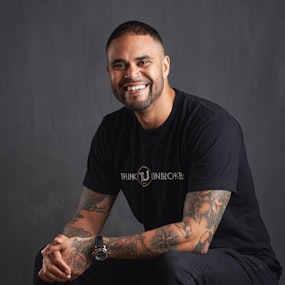
Michael Unbroken
Coach
Michael is an entrepreneur, best-selling author, speaker, coach, and advocate for adult survivors of childhood trauma.
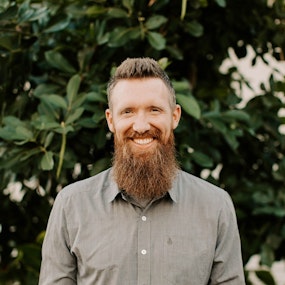
Brandon Turner
Real Estate Investor/Podcaster/Author/Entrepreneur/Speaker
Brandon Turner is a real estate investor, podcaster, author, entrepreneur, and speaker. As the previous host of the BiggerPockets podcast with over 100 million downloads, Brandon is widely recognized as one of the foremost experts on real estate investing. He is the best selling author of several books including "The Book on Rental Property Investing", "The Book on Investing In Real Estate with No (and Low) Money Down", "The Book on Managing Rental Properties", "How to Invest in Real Estate" and "The Intention Journal". Brandon is also the founder and managing member of Open Door Capital LLC, a private, well capitalized real estate investment firm that helps clients achieve superior risk-adjusted returns through the acquisition of value-add assets nationwide.
Welcome to The Think Unbroken Podcast!
Here are some of my favorite recent guests!






















